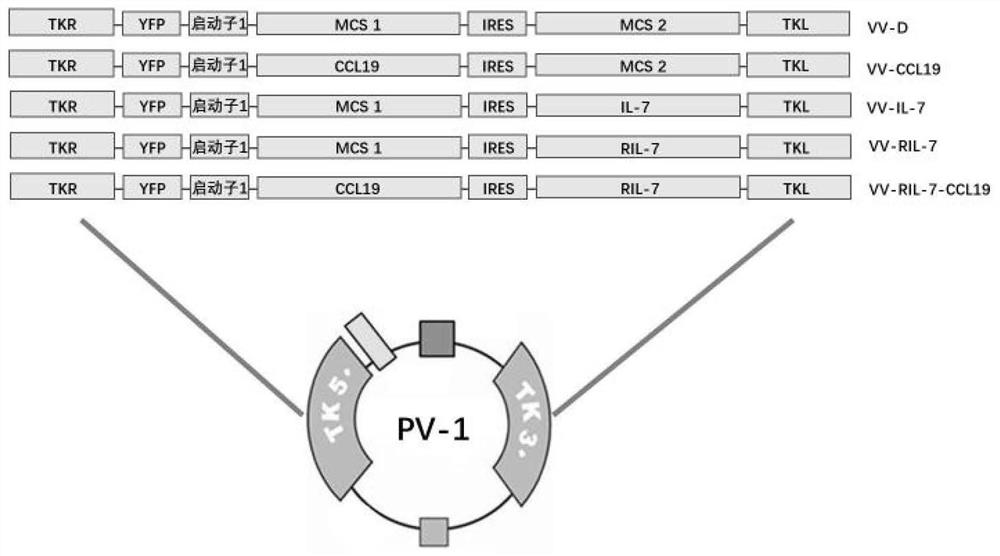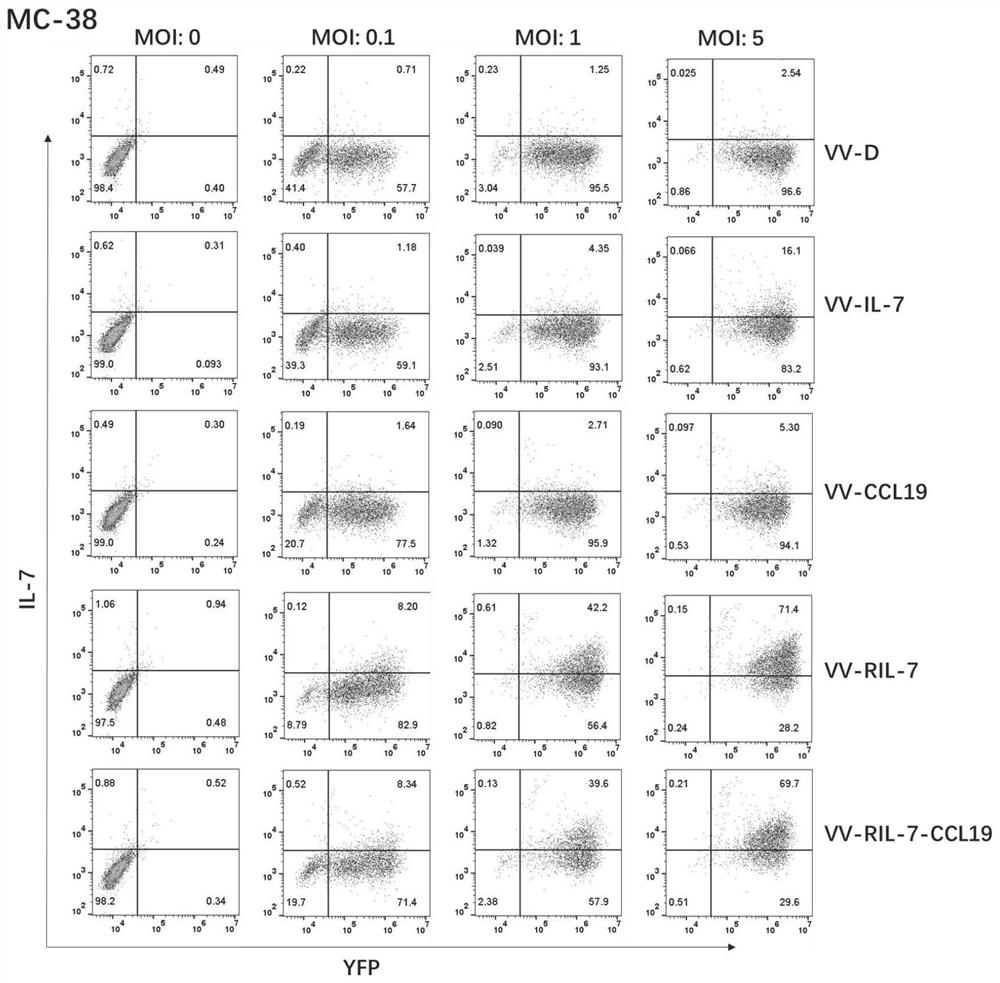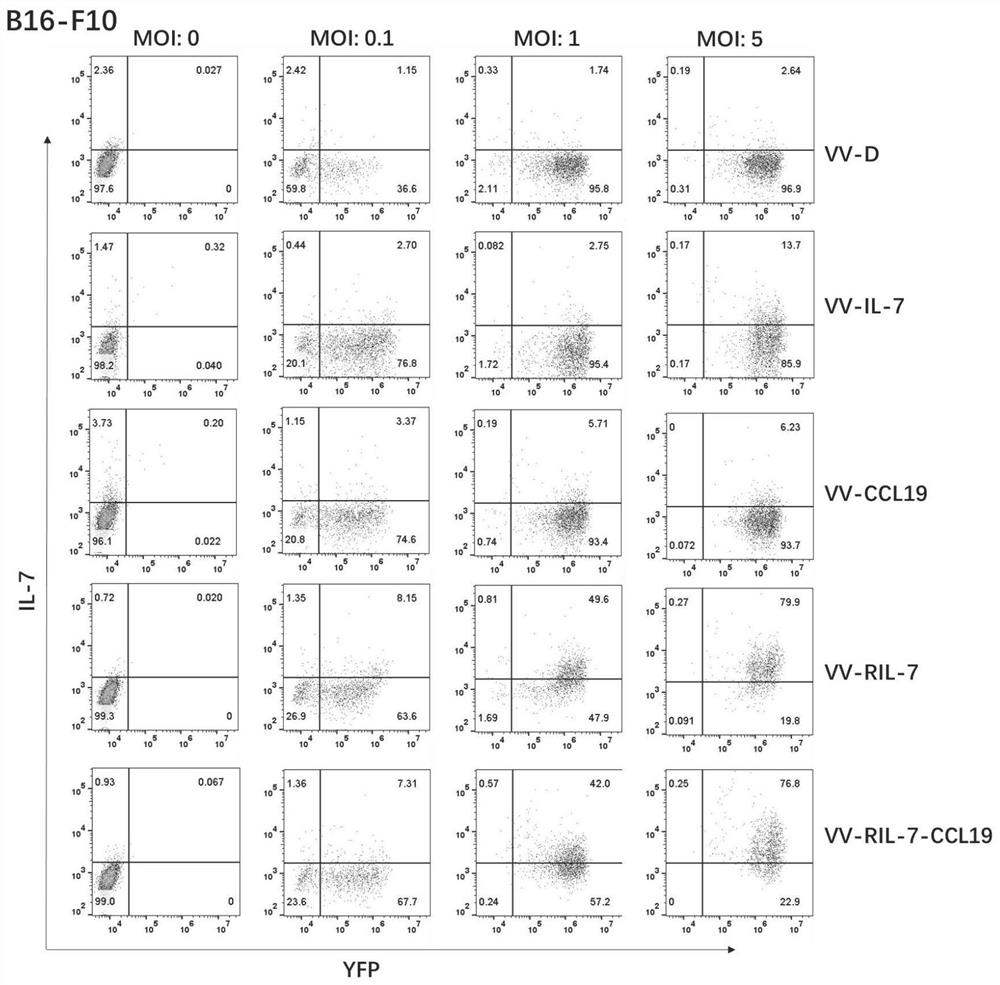Fusion gene RIL-7 combined CCL19 recombinant oncolytic vaccinia virus and application thereof in preparation of antitumor drugs
A VV-RIL-7-CCL19, RIL-7 technology, applied in the field of medicine, can solve the problems of cytokine side effects, blockage of anti-tumor immune circulation, limited direct promotion of anti-tumor immune cells, etc., to avoid cytokines Storm, the effect of promoting anti-tumor immune response
- Summary
- Abstract
- Description
- Claims
- Application Information
AI Technical Summary
Problems solved by technology
Method used
Image
Examples
Embodiment 1
[0099] 1. Establishment of recombinant oncolytic vaccinia virus VV-RIL-7
[0100] 1) Construction of the fusion gene of IL-7 and the cell membrane anchor sequence: the gene sequence of the wild-type IL-7 with the stop codon deleted, the EA3K rigid peptide gene sequence [or (G4S)3 flexible linker peptide sequence] and human CD16b by PCR The GPI-anchored gene sequence was spliced into a new type of fusion gene, which was named RIL-7.
[0101] 2) Restriction enzyme cutting sites are introduced into the two wings of the fusion gene RIL-7: SdaI and HpaI restriction enzyme cutting sites are introduced into the two wings of the fusion gene RIL-7 by PCR. Enzyme digestion, gel electrophoresis to separate the gene fragments, cut out the fragments of expected size, and use the DNA gel electrophoresis kit to separate the gene fragments for later use.
[0102] 3) Preparation of the cohesive end of the VV homologous recombination vector: Use SdaI and HpaI to cut the VV homologous recombi...
Embodiment 2
[0128] Example 2 Test of recombinant oncolytic virus infection of tumor cells expressing immune factors RIL-7 and CCL19
[0129] figure 2 It is the result of detecting the expression of IL-7 in the cell membrane by flow cytometry after the fusion gene RIL-7 recombinant oncolytic virus infected MC-38 cells. figure 2 Shown in is to confirm whether the fusion protein encoded by the RIL-7 gene carried by the recombinant oncolytic viruses VV-RIL-7 and VV-RIL-7-CCL19 can be anchored to the cell membrane. After infecting MC-38 cells with VV-RIL-7 and VV-RIL-7-CCL19 recombinant oncolytic viruses, the expression of IL-7 in the cell membrane was detected by anti-IL-7 monoclonal antibody staining and flow cytometry. The results showed that the presence of membrane-anchored IL-7 was detected on the surface of intestinal cancer cell MC38 cell membranes in the VV-RIL-7 and VV-RIL-7-CCL19 infection groups after recombination into the RIL-7 gene, while VV-D (knockout VV except the TK gene...
Embodiment 3
[0138] Embodiment 3 biological activity test
[0139] In order to identify whether the expression product of the fusion gene RIL-7 carried by the recombinant vaccinia virus has biological activity, T cells were obtained from spleen cells in this experiment, and divided into a resting T cell group and a PHA-activated T cell group and seeded in 96-well plates respectively. After infecting MC-38 cells with different recombinant vaccinia viruses at MOI=1 for 24 hours, digest and prepare single cell suspension, after washing with PBS, add the resting T cell group and PHA activated T cell group in proportion, and after co-incubating for 48 hours, use the MTT method The OD (optical density) value of each group was detected. The results showed that tumor cells infected with the recombinant vaccinia virus carrying the fusion gene RIL-7 could effectively stimulate the proliferation of resting and activated T cells, and this effect could be blocked by anti-IL-7 neutralizing antibody, whi...
PUM
 Login to View More
Login to View More Abstract
Description
Claims
Application Information
 Login to View More
Login to View More - R&D
- Intellectual Property
- Life Sciences
- Materials
- Tech Scout
- Unparalleled Data Quality
- Higher Quality Content
- 60% Fewer Hallucinations
Browse by: Latest US Patents, China's latest patents, Technical Efficacy Thesaurus, Application Domain, Technology Topic, Popular Technical Reports.
© 2025 PatSnap. All rights reserved.Legal|Privacy policy|Modern Slavery Act Transparency Statement|Sitemap|About US| Contact US: help@patsnap.com



